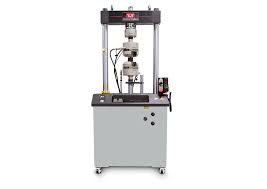Servo Hydraulic Testing Machine - play an important role in product development
Material and component testing machines play an important role in product development, quality control and research applications. Servo hydraulic testing machines utilize hydraulic actuation and servo control systems to enable high precision mechanical testing. These types of testers can perform a variety of material characterization, fatigue and durability tests.
In a servo hydraulic machine, a hydraulic pump drives oil at high pressure to hydraulic cylinders or actuators. The position and rate of motion of the actuators are controlled by servo valves which regulate the flow of oil. A feedback control system monitors the actual position and uses an actuator to adjust the servo valve, providing precise control of the hydraulic motion. By controlling the oil flow and pressure accurately, the actuators can produce forces and displacements that follow commands with minimal error.

The Key Components Of A Servo Hydraulic Testing Machine Include:
• Hydraulic pump - Produces pressurized oil to power the hydraulic actuators. Gear pumps or piston pumps are commonly used.
• Servo valves - Proportionally control the flow of oil to the actuators based on input commands.
This Enables Precise Position And Rate Control
• Actuators - Hydraulic cylinders that produce forces and motion.
Double-acting cylinders utilize oil pressure on both sides of the piston for maximum accuracy
• Load cell - Measures the actual load or force produced by the actuators.
• Linear variable differential transformer (LVDT) - Precisely measures actuator displacement.
• Control electronics - Includes a controller, amplifier and software to generate the hydraulic actuator commands and close the feedback control loop.
Benefits Of Servo Hydraulic Testing Systems
The key benefits of servo hydraulic testing systems are high load and force precision, fast response, long stroke length and a large load range. For materials testing, common applications include:
• Tensile testing - Measures ultimate tensile strength, elastic modulus and elongation at break.
• Compression testing - Determines compressive yield strength, elastic modulus and failure point.
• Flexural testing - Evaluates a material's resistance to bending and flexural modulus.
• Fatigue testing - Cyclically loads a specimen to determine how it withstands repeated stresses.
• Fracture toughness testing - Applies a load to a precracked sample to induce failure.
Servo hydraulic testers can also perform component level cyclic testing for applications like structural durability and high cycle fatigue. They can often simulate dynamic loads by controlling the actuators in displacement, velocity or acceleration modes.
What You should Consider When Choosing Servo Hydraulic Testing Machine
Key considerations when selecting a servo hydraulic testing machine include load capacity, stroke length, positioning accuracy, load/force precision, sampling rate and software features. Higher performance systems utilize larger hydraulic pumps and servo valves for more force and faster response. Additional options like temperature chambers, grippers and fixtures tailor the testers for specific applications.